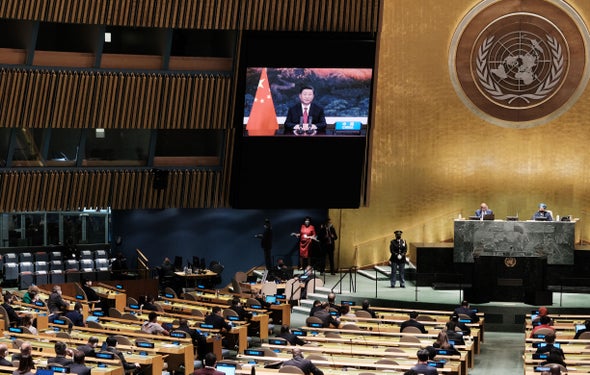Chinese President Xi Jinping actually held the 76th session of the United Nations General Assembly in New York on September 21, 2021. Credit: Spencer Pratt Getty imaging
China will stop building coal-fired power generation projects in other countries. President Xi Jinping said in a statement yesterday that it is expected to accelerate the global transfer of fossil fuels.
This commitment at the United Nations General Assembly in New York comes as other industrialized countries are reversing their economic policies to promote the construction of coal-fired power plants abroad, which are often energy deficient, vulnerable to poverty and climate change. China’s move masks similar decisions by South Korea and the top coal financiers of the group of seven (G7) (Climatewire, June 14).
Yesterday’s statement lacked important details, including when to start, but this did not prevent Xi Jinping’s statement from igniting optimism among observers.
Belinda Sch ä PE, the EU China climate diplomacy Research Institute of E3G think tank, said in an email: “the termination of Chinese funds may help to cancel more than 40 billion watts of pipeline projects in 20 countries – equivalent to Germany’s current coal fleet.”.
Yan Qin, senior analyst at refinitiv, said on twitter that the announcement would send a strong message that China’s leadership seriously fulfilled its commitment to “vigorously control” emissions.
Kevin Gallagher, director of Boston University Global Development Policy Center, said: “since the governments of major countries in the world have set an example and banned overseas coal-fired power plants, it is time for the private sector to follow suit.”.
A study he co authored found that more than 80% of global coal project financing came from private capital outside China.
China’s statement overshadowed the strong statements made by other world leaders at the conference, which focused on stimulating a global sense of urgency on climate change.
President Biden announced that by 2024, US international climate financing will quadruple to US $11.4 billion to help developing countries resist the most serious impact of global warming.
“This will make the United States a leader in public climate finance,” he said.
Joe Thwaites, a global climate finance expert at the World Resources Institute, said that if Biden can fulfill his promise, it may make the United States the largest contributor to global climate projects.
However, he said that many other countries, especially European countries, accounted for a larger share of their GDP.
Nevertheless, world leaders and climate organizations welcome the return of the United States to the global stage ahead of the United Nations climate summit in Glasgow, Scotland, this autumn.
British Prime Minister Boris Johnson said on Twitter: “Britain and the United States are leading the struggle to protect the earth – this is the motivation we need before @ cop26.”.
UN Secretary General ant ó NiO Guterres said he was encouraged by the statements of China and the United States, the world’s largest economies and climate polluters.
However, he added that the world still has a long way to go to solve the climate crisis.
Guterres said in his opening speech: “it is still a few weeks away from the United Nations climate conference in Glasgow, but it seems to be a few light years away from our goal.”. “We must take it seriously. We must act quickly.”
Saleemul Huq, director of the International Center for climate change and development in Bangladesh, said he hoped that the commitment of the United States would stimulate other countries to strengthen their commitment. Ten years ago, developed countries pledged to provide $100 billion in climate finance to poor countries every year. But this goal has never been achieved.
Hooker said the world’s most vulnerable countries want to know how much Biden’s commitment can be used for adaptation projects.
“We want at least half of the money to be spent on adaptation, but the past record is very bad,” he said.
At present, less than a quarter of the funds used for climate change adaptation are about US $16.7 billion a year. However, according to the adaptation gap report of the United Nations Environment Programme, the adaptation cost of developing countries is about US $70 billion a year, which is expected to increase to US $300 billion by 2030.
Guterres responded to the call for increased financing for adaptation and urged countries to stop fossil fuel subsidies and immediately stop the construction of coal-fired power plants.
He said that if all the planned coal-fired power plants were put into operation, “the goal of Paris would come to naught.”
It is unclear whether China’s commitment to stop overseas coal financing only applies to public finance, or whether it also applies to state-owned or commercial banks. According to the data of the coal plant tracking organization of global energy monitor, more than half of the coal projects in 10 countries have been supported by China.
The teacher delivered a speech at the United Nations last year, announcing that the carbon dioxide emission will reach 2030 and the goal of carbon neutralization rate of 2060 will be achieved. Yesterday, he said that China would strive to achieve these goals ahead of time and announced that it would increase its support for green and low-carbon energy in developing countries.
